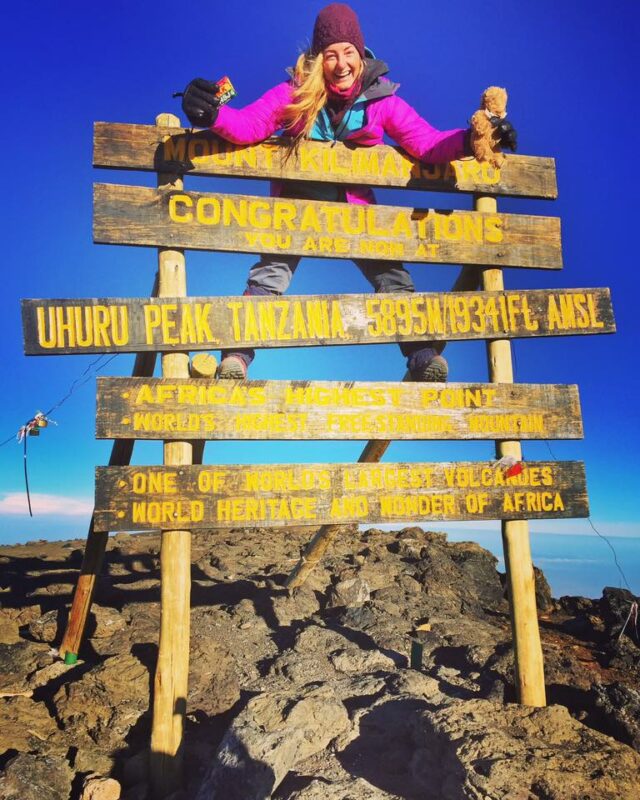
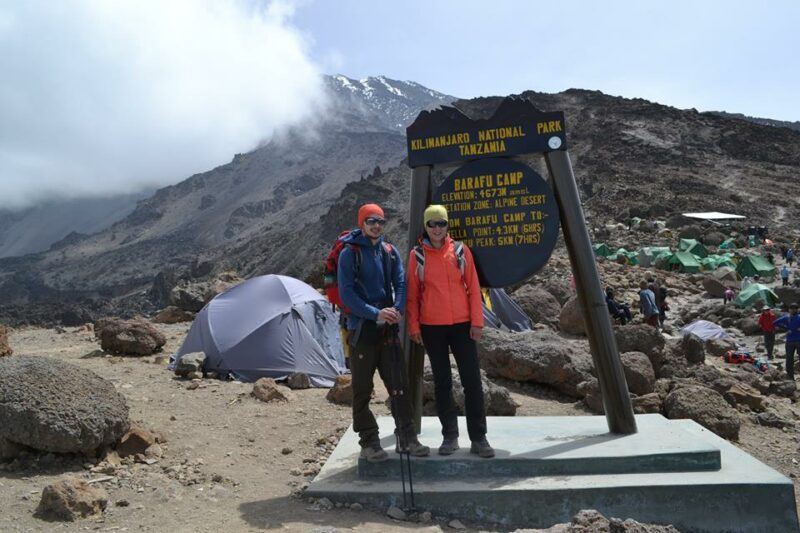
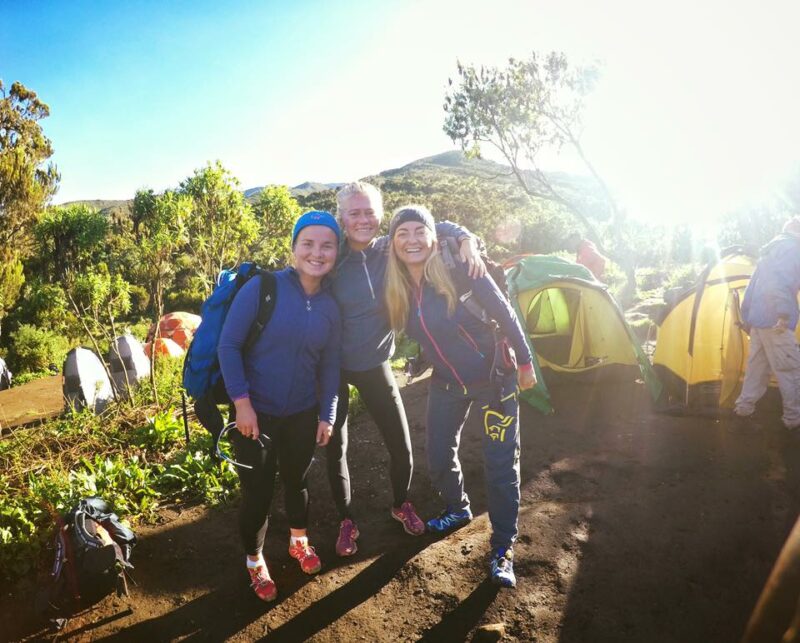
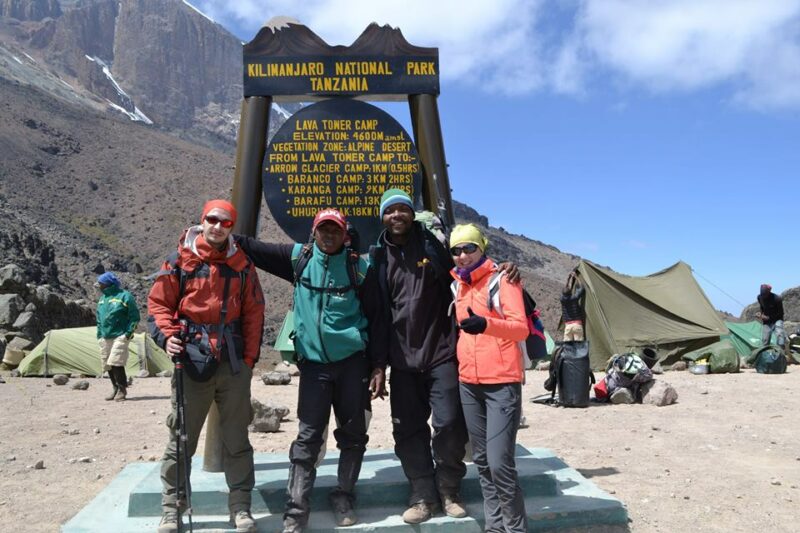

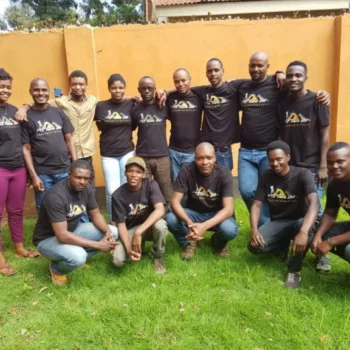
Summit Kilimanjaro - Machame Route Challenge: Experience the thrill of ascending Kilimanjaro, the crown jewel of Tanzania, on a 6-day expedition via the Machame Route.
This adventure is designed for those seeking both a challenge and an immersion into breathtaking natural beauty. Each day offers something new, from navigating Machame's steep ridges to camping under starlit African skies.
You'll tackle varied terrains, acclimatise as you ascend, and create memories with a group of like-minded adventurers. Your reward? The indescribable feeling of reaching the summit and watching the sunrise over the vast African landscape.
-
Day 1 - Arrival and Transfer to Moshi
- Airport pickup and transfer to hotel in Moshi.
- Evening briefing with guides and fellow trekkers.
- Prepare and rent necessary gear if needed.
Day 2 - From Moshi to Machame Camp
- Drive from Moshi to Machame Gate, then start the trek.
- Hike through lush rainforest to reach Machame Camp.
- Elevation gain from 1830m to 3050m over 11km in 5-6 hours.
Day 3 - Machame Camp to Shira Camp
- Leave rainforest, cross valley along a steep ridge.
- Trek through river gorge to reach Shira Camp.
- Elevation increase to 3850m over 5km in 4-5 hours.
Day 4 - Shira Camp to Barranco Camp via Lava Tower
- Ascend to Lava Tower for acclimatization, then descend to Barranco.
- Spectacular views along the ridge and from Shark's Tooth.
- Maintain elevation around 4000m over 10km in 5-6 hours.
Day 5 - Barranco Camp to Barafu Camp
- Climb the Barranco Wall, trek through Karanga Valley.
- Reach Barafu Camp, prepare for summit push.
- Ascend to 4700m over 9km in 6-8 hours.
Day 6 - Barafu Camp to Summit, down to Mweka Camp
- Start midnight trek to summit via Stella Point.
- Reach Uhuru Peak at sunrise, then descend to Mweka Camp.
- Ascend to 5895m, then down to 3090m over 18km in 10-13 hours.
Day 7 - Mweka Camp to Mweka Gate, drive to Moshi
- Descend to Mweka Gate, collect summit certificates.
- Navigate through forest terrain; return to Moshi for rest.
- Descend from 3090m to 1680m over 10km in 3-4 hours.
Day 8 - Departure from Moshi
- Drive back to the airport for departure.
- Reflect on the achievement of summiting Kilimanjaro.
- Say goodbye to the team and newfound friends.
Day 1 - Arrival and transfer to Moshi
We'll be there to meet you at the airport and whisk you off to your hotel in Moshi, the gateway to the Kilimanjaro National Park. In the evening you'll meet your fellow adventurers for a briefing from your guide about Kilimanjaro and your trek. This is a great opportunity to check you've got the kit you need - you can rent any kit needed.
Day 2 - Drive to Kilimanjaro National Park and hike to Machame Camp
The drive from Moshi to Machame Gate takes around 45 minutes and passes through the village of Machame on Kilimanjaro's lower slopes, where you'll get your first taste of the scenery you'll be hiking through.
We kick off our trek by walking through a lush rainforest on a winding trail climbing a ridge up to Machame Camp. It can be a bit muddy and slippery so trekking poles and gaiters will be useful if you have them.
Day 3 - Machame Camp to Shira Camp
After a hearty camp breakfast, we leave the leafy glades of the rainforest and keep climbing, crossing the valley along a steep rocky ridge with great views - cameras at the ready!
Following our route west, we'll trek through a river gorge to the Shira Campsite
Day 4 - Shira Camp to Lava Tower and Barranco Camp
Leaving the Shira Plateau, we climb a ridge, passing the junction that leads towards the peak of Kibo. The path leads up South East towards the spectacular Lava Tower, also known as 'Shark's Tooth' (4,650m).
After a photo break, we'll descend to the Barranco Camp. We'll end today at roughly the same elevation as we began, but fret not - today was all about acclimatisation and preparing your body for that all-important summit day. Plus the views, of course!
Day 5 - Barranco Camp to Barafu Camp
Once we're done with breakfast, we leave Barranco and start climbing up the steep ridge of the Barranco Wall (at around 4250m/13,900ft). It's a bit challenging, but totally worth it! Next, we trek through the beautiful Karanga Valley (at about 4050m/13,250ft) until we reach the junction that connects with the Mweka Trail. From there, we keep pushing forward towards the Barafu Camp. This is where the South Circuit comes to an end, and let me tell you, the views of the summit from here are absolutely breathtaking! We set up camp at Barafu and enjoy gazing at the distant summit. It's an experience you don't want to miss!
Elevation: 4000m/13,000ft to 4700m/15,350ft
Day 6 - Barafu Camp to Summit, down to Mweka Camp
In the wee hours of the morning (somewhere between midnight and 2 am), we press on towards the summit, sandwiched between the Rebmann and Ratzel glaciers. We head in a northwest direction, trudging through rough scree as we make our way towards Stella Point, which sits on the rim of the crater. This part is no joke – it's mentally and physically demanding! But fear not, because once we reach Stella Point, we take a breather and are treated to the most jaw-dropping sunrise you'll probably ever witness. If you're a speedier hiker, you might even catch the sunrise right from the summit.
From Stella Point, it's a snowy adventure all the way as we spend about an hour ascending to Uhuru Peak. And guess what? That's the highest point on Mount Kilimanjaro and the entire continent of Africa! It's quite an accomplishment.
After revelling in our triumph at the summit, we start our descent by heading straight down towards Mweka Camp. Along the way, we stop at Barafu for a well-deserved lunch. The loose gravel can be a bit tricky, so gaiters and trekking poles might come in handy. Finally, we reach Mweka Camp, where we savour our last evening on the magnificent mountain.
Day 7 - Mweka Camp to Mweka Gate, drive to Moshi
Once we're fueled up with breakfast, we start making our way down towards the Mweka Park Gate to collect those well-deserved summit certificates. As we descend to lower elevations, things can get a bit damp and muddy, so it's a good idea to have gaiters and trekking poles to tackle the terrain. You can probably ditch the heavy gear and rock some shorts and t-shirts but don't forget to keep your rain gear and warmer clothing handy, just in case.
When we reach the Mweka Gate, a vehicle will be eagerly waiting to whisk you away on a quick 30-minute ride back to your coSy hotel in Moshi. Time to kick back, relax, and reflect on the incredible journey you've just conquered!
Day 8 - Drive you back to the Airport
Is this a good trip if I'm travelling solo?
What's the typical age range?
Is there a minimum age for this trip?
How long do I need to climb Kilimanjaro?
When is the best time of year to climb Kilimanjaro?
Which route should I choose for the climb?
What level of fitness is required?
How much distance will we hike each day?
Why do we start the final ascent in pre-dawn darkness?
What if I am slower than other trekkers?
What if I am unable to reach the summit?
What type of staff will accompany me during the climb?
What size will the group be?
Do I need travel insurance?
Is the guide insured?
How much weight will I need to carry, and where can I store items not required during the climb?
What is provided, and what do I need to bring?
What is the accommodation like during the trek?
OTHER
Is there a discount for group bookings?
Is there a discount if I make my own way there or travel from a different starting point?

Your head guide for this trip is Emmanuel. Emmanuel has decades of experience leading tours under his belt and prides himself on delivering the best possible travel experience. He's one of the only Travel life-certified guides in Tanzania and a founding member of the Tunacare nongovernmental organisation which helps Tanzanian families in poverty. Emmanuel is passionate about social, economic and environmental sustainability.
Emmanuel allocates work to guides, cooks and porters on the basis of merit, continued performance and positive feedback from clients. Many of them are locals who have been part of his company for years.
